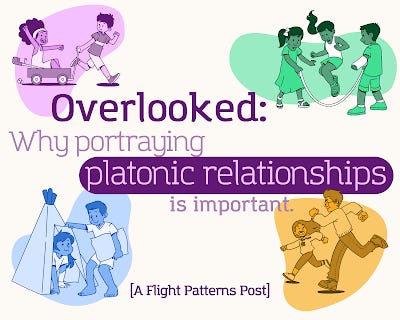Overlooked: Why portraying platonic relationships is important.
I'm going to confess something to you. The only thing I enjoy about romantic relationships in books and movies is the relationship part. The romance part? Bleck.
What is a platonic relationship?
A platonic relationship is a close friendship that is not romantic (and preferably stays that way.) Yet it still has (or should have) the aspects of a good relationship: teamwork, support, tension and opportunities to grow.
Why should platonic relationships be featured more often in books, movies, and other media?
Proportionally, a person has (or should have) far more platonic relationships than romantic relationships in their real life. There's friends, co-workers, mentor figures, and.... *gAsP* siblings, to name a few of the most prominent relationships.
I experience art to explore other people's experiences vicariously. And I don't enjoy experiencing someone else's romantic relationship in every story. I want to see how characters interact with their friends. Their siblings. Random strangers that they'll never see again. That's what speaks to me.
Here are some examples of my favorite platonic relationships:
Jason and Madeline in The Crescent Stone by Matt Mikalatos.
Freak, River, and Fiona in What We Found In The Sofa by Henry Clark.
Tess, Asher, and Henry in The Fixer by Jennifer Lynn Barnes.
Libby and Jackdaw in I Am Princess X by Cherie Priest.
Lina and Doon in The City of Ember by Jeanne DuPrau.
Noah and Claudia in Cloud and Wallfish by Anne Nesbet.
In my own writing: Tung and Jess in Victory or Death.
The importance of sibling relationships.
*Sigh* I know there are [MANY] times we don't like our siblings. With three(!) teenage brothers in the house, they can get on my nerves. (One of their favorite things to do is knock on my door when I'm writing.....😂)
But remember the "teamwork, support, tension and opportunities to grow" that I was talking about earlier? Heh... well ...siblings offer all of the above. And when you spend so much time around your siblings, you don't have to do any research! If you're an only child, there's probably a sibling in your friend group who will tell you STORIES.
God created romance, and it's important. But He also created families. And they are just as dramatic and tension filled as romantic relationships.
Examples of my favorite sibling relationships:
Janner, Tink, and Leeli in The Wingfeather Saga by Andrew Peterson.
The Pevensies in The Lion, The Witch and The Wardrobe by C. S. Lewis.
Ben, Tom, and Lindy in The Last of the Really Great Whangdoodles by Julie Andrew Edwards.
In my own writing: Matthias and Julia of The Prince's Mousetrap.
Cousin relationships
Cousin relationships are very much overlooked...*searches brain to think of examples* yeah I'm blanking. Corinthia and Jadon in my story Untamed are cousins, though.
Adopted-as-Siblings relationships
This has become a popular trope recently. It's where a group of unrelated children or young adults, who are often orphans, "adopt" each other as family and have a deep bond with each other.
Some examples are:
Shula and Yenil in The Heartwood Crown by Matt Mikalatos.
Barclay, Rosemary, and Willa in the Shadows Over England series by Roseanna M. White.
Sara, Lily, and Ethan in Ad Bellum by Moriah Armstrong.
Some common flaws in writing platonic relationships.
Ironically, the biggest flaw I've seen is giving a relationship no flaws at all. Perfect relationships, especially sibling relationships, are unrealistic. It doesn't have to be some life-altering fight, something as simple as disagreeing about pizza toppings adds some interest because I want to see how they solve their disagreement.
Too many relationships can make a book too complicated and difficult to follow. I've never read a book with over five strong relationships explored well.
If one of the characters is flat, we dislike both the flat character and the main character for liking the flat character. We wonder what they're thinking! It seems unrealistic.
If the characters have no legitimate reason for being friends. Being siblings is a good reason. Having common interests is a good reason. Shared history/secrets is a good reason. But if the writer simply says "character X and character Y are friends" it's telling, not showing. Friendships happen...and continue... for a reason. If the reader doesn't see that reason, the friendship isn't as powerful as it could be.
That's all for today, check back next Tuesday for another post. And, if you haven't signed up for my email newsletter yet, quick, do that here! I have some announcements to make you don't want to miss coming out July 14th.
Do you have a favorite fictional relationship? Or, any funny sibling stories? Let me know in the comments below, and have a great week!



